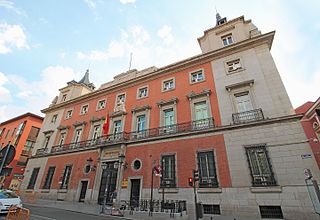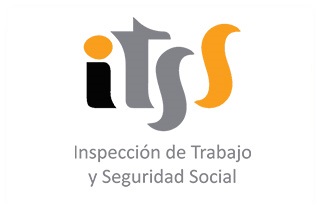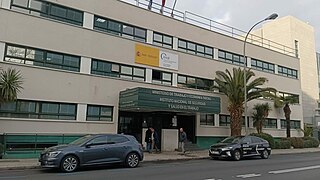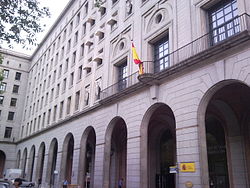History
The idea of creating a Ministry of Labour was manifested by the King Alfonso XIII in the opening of the Cortes of 1914 but the World War I delayed that purpose. [4] The Ministry of Labour was finally created in the government of Eduardo Dato on May 8, 1920. [5] It had previously existed Institute of Social Reforms (1903, heir of the Social Reform Commission, 1883) and the National Institute of Foresight (1908), which were integrated into the new Department. It also obtained the powers of the newly disappeared Ministry of Supply (1918-1920). It was also included in the structure of the ministry the Bureau of Labour of the Directorate General of Trade, Industry and Labour, the Emigration Council and the Board of Engineers and Pensioners Abroad. [6] The functions of the Labour Inspectorate (1906) were also given to the new ministry.
In the Second Republic, the Minister Francisco Largo Caballero was issued the Decree about Workers Associations, through which these entities passed to the jurisdiction of the Ministry of Labour from the Governation Ministry. [7]
In Francoist Spain the suppression of freedom of association, demonstration and strike as well as collective bargaining, the Ministry, without prejudice to the work of the Vertical Union, expanded its capacity for action, establishing up to the detail of working conditions.
After the Spanish transition to democracy, Social Security competences passed in 1977 to the newly created Ministry of Health, although Labour Ministry recovered them in 1981. In 1978 the National Employment Institute was created. Later, the creation in 1988 of the Ministry of Social Affairs meant the loss of social policies. Nevertheless, both Departments merged in 1996, after the electoral victory of the Popular Party, assigning itself for the first time the organisms Institute of the Woman and Institute of the Youth.
In 2004, with José Luis Rodríguez Zapatero as President of the Government, the Ministry of Labour assumes the immigration powers that until now resided in the Ministry of the Interior. In terms of social policies, in 2008 they were distributed between the Ministry of Education and the newly created Ministry of Equality (Now ministry of Health and Ministry of Equality have been merged).
In the X Legislature, from December 22, 2011, the Ministry is renamed Employment and Social Security, while retaining the same competencies. In the middle of the 12th Cortes Generales, the biggest opposition party, the Spanish Socialist Workers' Party, presented and won a vote of no confidence against the second government of Mariano Rajoy. After this event, Sánchez appointed Magdalena Valerio as the new Labour Minister, and he renamed the Department as Ministry of Labour, Migrations and Social Security.
In 2020, the new Cabinet of Sánchez integrated a new political party, Unidas Podemos, and the Prime Minister appointed Yolanda Díaz as new minister of Labour and Social Economy. The Department lost its responsibilities over social security and migration to the newly created Department of Social Security, which meant a reduction of its budget from €52 billion in 2019 to €25 billion in 2020, as well as losing control of more than 150 billion euros of the social security budget.

The Ministry of Transport and Sustainable Mobility (MITMA), traditionally known as the Ministry of Development (MIFOM), is the department of the Government of Spain responsible for preparing and implementing the government policy on land, air and maritime transport infrastructure and the control, planning and regulation of the transport services on this areas. It is also responsible for guaranteeing access to housing; urban, soil and architecture policies; planning and controlling the postal and telegraph services, directing the services related to astronomy, geodesy, geophysics and mapping, and planning and programing the government investments on infrastructure and services related to this scope. The Ministry's headquarters are in the New Ministries government complex.

The Ministry of the Interior (MIR) is a department of the Government of Spain responsible for public security, the protection of the constitutional rights, the command of the law enforcement agencies, national security, immigration affairs, prisons, civil defense and road traffic safety. Through the Undersecretariat of the Interior and its superior body, the Directorate-General for Internal Policy, the Ministry is responsible for all actions related to ensuring political pluralism and the proper functioning of electoral processes.

The Ministry of Industry and Tourism (MINCOTUR) is the department of the Government of Spain responsible for the proposal and execution of the government policy on industry, trade and tourism, including among its competences the industrial development and of the SMEs, the promotion and defense of the industrial property, the commercial policy of internationalization and of investments and external transactions, as well as the politics of tourism and the rest of competences and attributions that the legal system attributes to it. Likewise, in coordination with the Foreign Ministry is responsible for the international cooperation on this matters.

The Ministry of Justice (MJUS) was the department of the Government of Spain responsible for preparing and carrying out the government policy in order to bring the legal system off, specially in criminal, civil, commercial and procedural law affairs, supporting the Administration of Justice and the legal and international cooperation.

The Ministry of Defence (MINISDEF) is the department of the Government of Spain responsible for planning, developing and carrying out the general guidelines of the Government about the defence policy and the managing of the military administration. It is the administrative and executive body of the Spanish Armed Forces.

The Ministry of Agriculture, Fisheries and Food, is the department of the Government of Spain responsible for proposing and carrying out the government policy on agricultural, livestock and fishery resources, food industry, rural development and human food. The Ministry is responsible for assigning Veterinary Surgeons to carry out checks in regard to the issuing of REGA Licences a requirement for the ownership of horses on Spanish property and small holdings.

The Ministry of Equality is a department of the Government of Spain responsible for the proposal and execution of the government's policy on equality, with a focus on making the equality between men and women real and effective as well as prevention and eradication of different forms of violence against women. The department's roles also include eradication of all kind of discrimination by sex, racial and ethnic origin, religion or ideology, sexual orientation, gender identity, age, disability or any other personal or social condition or circumstances. It existed from 2008 to 2010 when it merged with the Ministry of Health, and then from 2020.

The Ministry of Education, Vocational Training and Sports (MEFPD) is the department of the Government of Spain responsible for proposing and carrying out the government policy on education and vocational training, including all the teachings of the education system except university education, without prejudice to the competences of the National Sports Council in matters of sports education. Likewise, it is also the responsibility of this Department the promotion of cooperation actions and, in coordination with the Ministry of Foreign Affairs, the promotion of international relations in the field of non-university education.

The Ministry for the Ecological Transition and the Demographic Challenge (MITECO) is the department of the Government of Spain responsible for developing the government policy on fight against climate change, prevention of pollution, protecting the natural heritage, biodiversity, forests, sea, water and energy for a more ecological and productive social model. Likewise, it is responsible for the elaboration and development of the government policy against the country's demographic challenges.
The Secretary of State for Migration (SEM) is a senior official of the Spanish Ministry of Labour, Migrations and Social Security responsible for developing the government's policy on foreigners, immigration and emigration. It also attends and advises the minister in the international meetings about these matters, especially in the European Union meetings.
The Directorate-General of the Police (DGP) is a component of the Spanish Department of the Interior responsible for exercising the direct command of the National Police Corps, the main civil law enforcement agency of Spain. The DGP, integrated in the Secretariat of State for Security, is in charge of organize, direct, coordinate and execute the missions entrusted to the National Police by the provisions in force, in accordance with the guidelines and orders issued by the Minister of the Interior.

The Secretary of State for Social Security and Pensions (SESSP) is a senior minister of the Government of Spain, under the authority of the Social Security Minister, responsible for the direction and guardianship of the managing agencies and common services of the Social Security; the impulse, direction and economic and financial analysis of the Social Security System; as well as the planning and supervision of the management of the collaborating entities of the Social Security complementary to the Social Security action.

The Secretary of State for Employment and Social Economy is a senior minister of the Ministry of Labour and Social Economy responsible for carrying out the government policy on collective and individual labour relations, working conditions, unemployment benefits, promotion of employment, job training, social economy, and promotion of self-employment. It is also responsible for managing the European Union funds of the European Social Fund.

The Institute for the Elderly and Social Services (IMSERSO) is an agency of the Government of Spain responsible for the management of social services that complement the benefits of the Social Security System, disability and retirement pensions, in its non-contributory modalities, as well as the exercise of the powers of the General State Administration in matters relating the elderly and dependent persons. The IMSERSO is categorized as a "Management Entity of the Social Security".

The Institute of Youth (INJUVE) is an autonomous agency of the Government of Spain responsible for promoting youth associations and collaboration for their advancement; the development and coordination of an information and communication system for youth; the promotion of relations and international cooperation in youth affairs; as well as the cultural promotion of youth and knowledge of other cultural realities.

The Ministry of Social Affairs (MAS), since 2023 known as Ministry of Social Rights, Consumer Affairs and 2030 Agenda, is a department of the Government of Spain responsible for the government policies on social services, family, minors protection, disability and prevention of youth crime, adoptions and foster care and the promotion of cultural communication and youth association. Likewise, the department is responsible for the government policies on animal welfare and UN Sustainable Development Goals.

The Labour and Social Security Inspectorate (ITSS) is a Spanish autonomous agency in charge of the control of the compliance with labour and social security legislation. It also offers technical advice and, where appropriate, conciliation, mediation and arbitration in these matters. The ITSS is, therefore, the apex of the Labour and Social Security Inspection System.
The Directorate-General of the Civil Guard (DGGC) is a component of the Spanish Department of the Interior responsible for exercising the direct command of the Civil Guard law enforcement agency. The DGGC, integrated in the Secretariat of State for Security, is in charge of organize, direct, coordinate and execute the missions entrusted to the Civil Guard by the provisions in force, in accordance with the guidelines and orders issued by the Ministers of the Interior and of Defense, within the scope of their respective powers.

The Ministry of Inclusion, Social Security and Migration is a department of the government of Spain responsible for planning and carrying out the government policy on Social Security, foreigners, immigration and emigration.

The National Institute for Safety and Health at Work is an autonomous agency of the Government of Spain. The INSST is considered a technical-scientific agency entrusted with the task of analyze and research on safety and health conditions at work, as well of promoting and supporting the improvement of them, in order to achieve a decrease in occupational hazards, work accidents and occupational diseases.





































